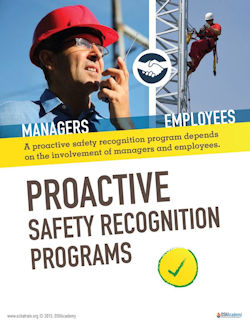Proactive Safety Recognition Programs
Companies need to know that the most effective safety recognition programs promote proactive behaviors that help to prevent accidents.
Proactive recognition programs reward employee behaviors that are:
- required - mandated by the employer and/or OSHA regulations, and
- encouraged - not required but promoted by the employer.
While reactive safety programs function only to minimize the negative impact of accidents that have already occurred, proactive programs aim to prevent future accidents. The bottom line is, it’s much more important to recognize proactive behaviors.
Supervisor and manager required behaviors include:
- personally conducting regular safety inspections;
- responding to unsafe behaviors; and
- requiring safety training for affected employees.
Employee required behaviors include:
- following company and OSHA safety rules;
- inspecting fall protection before use; and
- reporting work-related injuries and illnesses.
Behaviors the employer encourages include:
- making safety suggestions;
- participating in safety (committees, teams, events, etc); and
- reporting hazards and unsafe behaviors (without naming names).
The Benefits of Proactive Programs
When employers recognize proactive behaviors, not only does the number of accidents decrease, but involvement in safety and health also increases. Everyone is more aware, interested, and involved in uncovering hazardous conditions, unsafe behaviors, and safety management system weaknesses. The company benefits from lower accident costs, higher morale, and greater production.
Knowledge Check Choose the best answer for the question.
3-7. Which of the following safety behaviors is proactive?
You forgot to answer the question!

